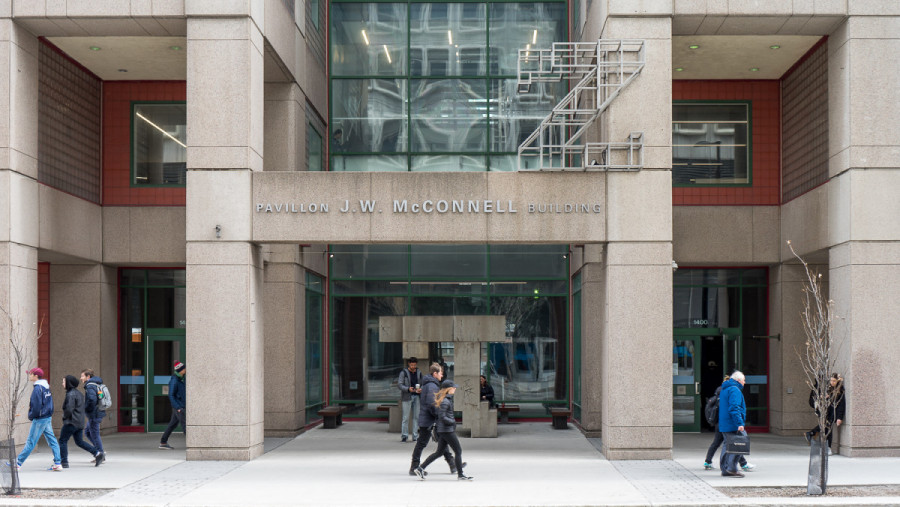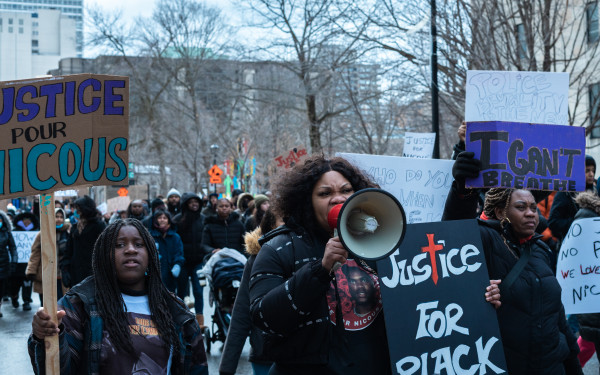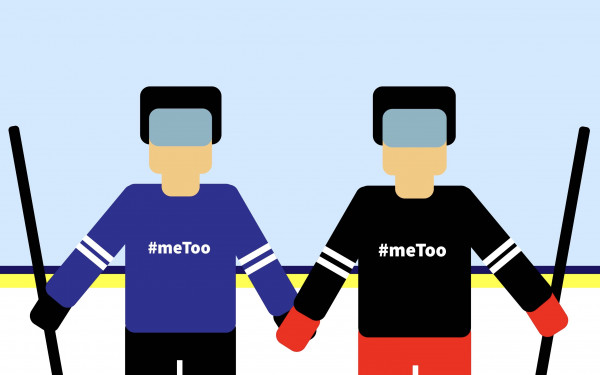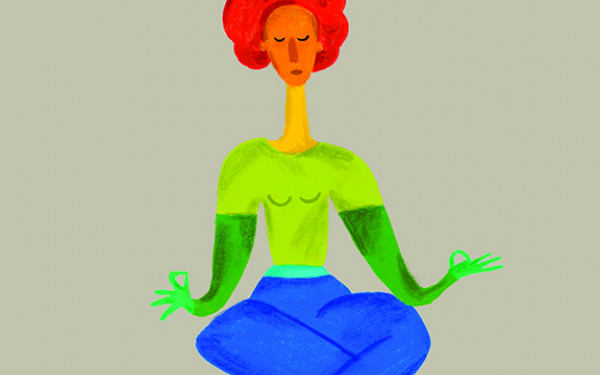Tenured film studies professor accused of racism
Students demand reform and removal after racist language used in class
On Aug. 5, Rose Stiffarm posted on the New Concordians 2019/2020 Facebook page that the past year had been her worst “due to ongoing racism in my master’s in film studies program at Concordia University.”
Stiffarm has been the “Indigenous voice” in the room and had her opinion challenged and dismissed when speaking from lived experience. Stiffarm said she was not treated the same as other students, who were able to speak from their experiences unimpeded.
“To completely discredit my previous film history and film studies classes when my classmates coming from other disciplines aren’t questioned to that same degree, it makes me feel like I’m not supposed to be in the classroom or I’m not supposed to be talking so much,” Stiffarm told The Link.
During a lecture taught by Professor Catherine Russell in Sept. 2019, the class watched four films that used footage from the National Film Board. Stiffarm expressed disappointment that the Indigenous filmmakers were given a global platform only to be limited to works already in existence.
Accusations have also been made that Russell used racist language.
A petition started by anonymous students in the program, now submitted, states that Russell twice spoke the n-word during a methods in film studies class on Oct. 28, 2019.
In her post online, which linked the petition, Stiffarm explained her professor used the n-word in a loose translation from French to English in relation to Pierre Vallière’s writing and about Quebecois being treated like the n-words of Canada.
“The entire seminar room fell silent, and many students report having felt difficulty registering Professor Russell’s nonchalant use of such a hateful racial slur,” Stiffarm said. She recalled Russell saying she was aware of the “charged history” of the word but justifying her actions by stating that it was the title of the text and again spoke the text’s title, including the n-word.
The petition itself was much more direct, stating Russell “weaponized her authority, privilege, and power as a white professor.”
The petition also mentioned that while Russell chose to include this particular work in the syllabus, there are no works by Black authors, and of the 31 authors, only two were non-Black POC.
This particular Vallières text was called out during a June 7 Black Lives Matter protest. Speakers said many recent articles use the text to deny the presence of systemic racism in the province.
Another former student of the film production department, John—not his real name, wanted to keep his identity anonymous for fear of repercussions. He said he experienced various racist comments and behaviours from faculty before he graduated in 2017.
John, who is Black, said the program itself was overwhelmingly white. Of 70 students in his year, he recalls only four being minorities.
“My only two options are to be quietly offended and deal with the trauma by fully internalizing it or saying something and then being traumatized by people’s complacency. And that’s what it’s always felt like when I was addressing any kind of racism or discrimination in the classroom.” —John
John understands why people would be reluctant to come forward. “You aren’t going to be someone they can just hire and say whatever they want to, and a lot of times what they want to say to you would be pretty offensive.”
Once people start coming forward, John said, it puts pressure on others to come forward. “A lot of people don’t want to have to deal with that, and rightfully so, why would you invite this into your life?” he said. No white person would want to invite the realities of being Black in a North American white society, he added.
Prior to discussing Vallières text in class, Russell said people are “too PC nowadays” and “academia’s journey towards absolute truth is too idealistic,” according to Stiffarm.
Stiffarm went to the graduate program director of film studies in the spring about Russell’s use of the n-word and was told he would speak to her.
“The university is already working to address this in various ways, including through ongoing discussions between students and the faculty that have now been taking place for some time,” said Concordia spokesperson Vannina Maestracci. “During these exchanges, the professor has also written to the complainant and the entire class to apologize.”
To Stiffarm, Russell’s apology made it clear she had only recently been made aware of the issue. “It didn’t feel genuine,” she added.
Russell stated in her apology that she was disappointed the matter was not brought to her attention sooner—something Stiffarm characterized as a form of victim-blaming.
The authors of the petition did not wish to comment, but the petition has been submitted to the university.
“[The authors] are reluctant to make waves that are too big, for fear the university will just be responding to PR and not focusing on making real change within the university,” she said.
The petition reads in part that “Professor Russell’s weaponization of the n-word exposes an urgent need for the film studies program to specifically commit to centering Black perspectives and ridding anti-Blackness from our place of study and research.”
The petition had seven key demands, including the removal of Russell from the methods in film studies class for the duration of the 2020/2021 academic year.
Over the summer, many departments put out letters about not tolerating racism and asking students to sign them. The film studies department sent one to its students as well.
“I felt gross because I knew what happened in class and those actions don’t line up,” Stiffarm said. “I chose not to sign that particular letter.”
Stiffarm did sign an alternative letter written by a fellow master’s student. It called out the program for “its own racism,” and while the micro-aggressions she faced were included in an initial draft, they were later dropped to focus more on Russell’s use of the n-word.
Russell did not respond to requests for comment.
John explained one of the films they watched, Birth of a Nation, often referred to as “quintessential,” is also a KKK propaganda film. While it is celebrated, this is too often glossed over, he said.
“Oftentimes the way we would discuss that is with praise of the work. Praise of the way the content is structured and very little analysis of what that content would mean if you’re not a white person in that room. And when you’re going to show that movie in class, I skip class,” he said.
“It’s hard to even remember the levels of how I felt insulted while I was there,” he added, “because it was so ingrained into the way we approached the base ideas of the subject that I felt like I was stifled from the get-go.”
During his first year, John made a film about a Black friend and his fears in his passion, omitted here for privacy reasons. John used an additional person in the same domain to embody those fears, who happened to be white.
“We took the largest guy [there]. That guy just so happened to be white,” John said. After showing it at the end of year gala, students approached him and expressed how “cool” they thought it was that John included a commentary on racism, solely because of the race of the two men shown.
“The framework of where I was made it very difficult to be Black, and there was no way I could operate in that framework without being perceived as Black,” he said. “My choice to portray a Black man going up against a white person who embodied his fear meant that I was making something about racism, but I wasn’t.”
John recounted that in acting and directing class, the professor, Micheline Lanctôt, was “very insistent” on what roles she saw John in. “Police captain, security guard, truck driver—every Black role from the 70s with a guy with a mustache—I got all of those,” he said.
Eventually, John noticed a pattern and called her out. After offering alternative roles and questioning if she was typecasting him, the conversation became tense.
This led to Lanctôt telling a story about meeting a truck driver in the U.S. and used the n-word multiple times. John wondered why she didn’t censor herself while telling the story.
Later that day, Lanctôt sent him an email attempting to explain herself.
John said the email didn’t address any of what occurred during that class. “It was always like they couldn’t see the actual issue,” he added.
“My only two options are to be quietly offended and deal with the trauma by fully internalizing it or saying something and then being traumatized by people’s complacency. And that’s what it’s always felt like when I was addressing any kind of racism or discrimination in the classroom,” John explained.
Lanctôt did not respond to requests for comment.
While Concordia has claimed that it “stands in solidarity with those who combat hatred in any form through peaceful means” and launched an Equity, Diversity, and Inclusion initiative two years ago, many feel more can be done.
Stiffarm suggested introducing something similar to the “It Takes All of Us” sexual violence awareness and prevention campaign, but covering racial and cultural relations.
“I think if there were some kind of ‘undoing institutional racism’ training that it could be beneficial to staff and faculty that work within the university and for students. That would make it a safer space,” she said.
John doesn’t think training would fix the issues but did offer a possible counter solution, however. He thinks including more race related material in classes across departments would benefit students.
John recounted how an urban planning professor showed a video of an officer shooting a man and reporting it as the man trying to take his weapon. The professor argued this could have been avoided if urban planning wasn’t inherently racist.
“He took the subject and showed how that subject applies to a racial discussion,” John said. “A lot of things that do end up discussing race at Concordia are kind of race first, which is a problem. It should be the subject and then how that subject has that inherent racism within it.
“Why race is important when considering urban planning is much more effective than telling people ‘This is the right thing to say, this is not the right thing to say’ is because then you understand more about ‘Hey, that thing that you’re passionate and interested in, there’s a way that it affects real people,’ and I think that’s very important for people to know,” he said.
As an Indigenous person, Stiffarm knows that her actions are perceived to reflect not just on her, but her community as a whole. “That is different than how this particular professor is carrying herself,” she said. “For her, she just represents herself apparently, but at this moment, she’s still representing Concordia.”
“For me, accountability isn’t just a one-time thing, but an ongoing process,” Stiffarm concluded.
Editor’s Note: This article has been updated to remove identifying information about an anonymous source.







